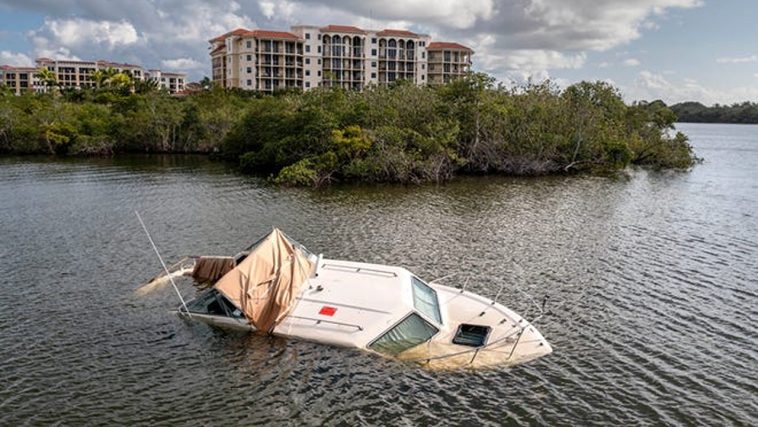There has been a novel development occurring in South Florida, where an increasing number of transients have been occupying abandoned boats off the coastline throughout this past winter. Martin County, which has had its share of vagrants and has dealt with the problem of derelict vessels separately, suddenly found these two issues merging in 2023. This discovery came to the attention of Chief Deputy John Budensiek and his marine deputies as they undertook the task of identifying and clearing the derelict boats. To their surprise, many of these decommissioned vessels served as makeshift homes for the itinerant population.
Last year’s local reports have been highlighting the unexpected influx of transients choosing to inhabit these forsaken boats. The Martin County Sheriff’s Office has been working diligently to either evict these boat squatters or enforce regulations that would bring these derelict vessels up to acceptable standards. These would be vessels found in waterways, with at least two violations, such as faults including absent engines or fuel leaks. Discarding derelict boats is considered a state crime that may end with imprisonment or fines.
Martin County stands on Florida’s eastern coast, approximately 40 miles to the north of Palm Beach. It’s a bustling hub for boating enthusiasts, fishermen, and tourists alike, often used as a departure point for sailboats heading for the Bahamas. Due to the large number of vessels frequenting the area, a certain percentage inevitably falls into disrepair, becoming inoperable over time. Chief Deputy Budensiek pointed out the environmental hazards posed by these abandoned boats leaking fuel or human waste.
Further complicating matters, many boat owners either desert their unseaworthy vessels or sell these to individuals who fail to re-register them. These new owners continue to stay aboard or operate these boats until they become entirely unusable and potentially dangerous, either sinking or leaking harmful substances. This new habit of occupying derelict boats is chiefly attributed to transients fleeing the harsh winter climates of the northern regions.
The Deputy Chief indicated that the prevalence of these abandoned boats had seen a significant increase over the past year. As 2023 drew to a close, at least 50 boats discarded over the year had been located and documented by the Sheriff’s Office. Among these, 29 were cleared and demolished, while the remaining vessels were brought up to standard.
Budensiek emphasized that those residing on these boats were predominantly vagrants troubled by addictions and mental health challenges, with no intention of improving their living conditions. Contrary to what one might assume, they are typically not homeless individuals earnestly seeking employment and striving to escape their predicament.
Efforts to deal with the transients in the area face their own set of challenges—namely the seasonal surge of vagrants due to the warmer South Floridian winter. While the authorities realize that these individuals have rights and are not unwelcome, they also recognize the potential negative impact on the quality of life of local taxpayers and the necessity of maintaining the safety and cleanliness of their waterways.
The task of distinguishing between a disreputable but compliant boat and a derelict vessel occupied by squatters can often prove challenging, according to Budensiek. It’s not uncommon to find vagrants living on otherwise functional vessels, which might appear uninhabitable to the average person.
The Sheriff’s Office is actively pursuing to enforce the legalities of these derelict vessels, either ensuring compliance with regulations or disposing of them. Concurrently, they administer checks in coordination with the U.S. Coast Guard on vessels anchored outside the water channels to see if they meet the required code. These tests often check for operational lighting to ensure the vessels’ visibility during nighttime navigation.
Furthermore, Budensiek considers the environmental implications of these vessels a significant area of concern. Many of these derelict boats lack functional lavatory facilities, raising fears of untreated waste being discharged directly into local bodies of water by the squatters. This severe environmental issue is a core focus for the authorities.
In order to tackle this problem, the authorities deploy dye tests to determine if any leaking sewage is present. Suspected derelict boats’ toilets are filled with dye and subsequently monitored for leakage into the surrounding waters. This test serves as a reliable method of identifying boats that pose an environmental risk.
Contrary to national trends, Martin County has seen only minimal incidents of squatting in residential properties since the pandemic. Their main focus has been addressing boat squatters and individuals moving into the county using RVs, who often abandon their vehicles once they become nonfunctional.
The process of locating and demolishing the derelict boats carries a massive cost burden, ranging between $7,000 to $40,000 per vessel. However, these expenses are covered by the boater registration fees rather than being drawn from tax funds, offering some relief to the residents of Martin County. Allocating a portion of the registration fees for the disposal of derelict boats aims to maintain the appeal of their waterways for both locals and visitors.
The Sheriff’s office is co-operating with both state agencies and the Coast Guard in addressing this issue. Their collective goal is to identify and deal with derelict boats effectively, reinforcing their commitment to preserving the beauty and safety of boating within Martin County. Their efforts are conducted on a local, state, and federal level, determined to resolve this complex issue and safeguard their community’s natural resources.



